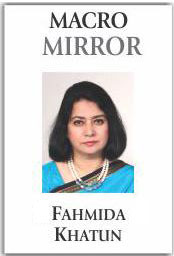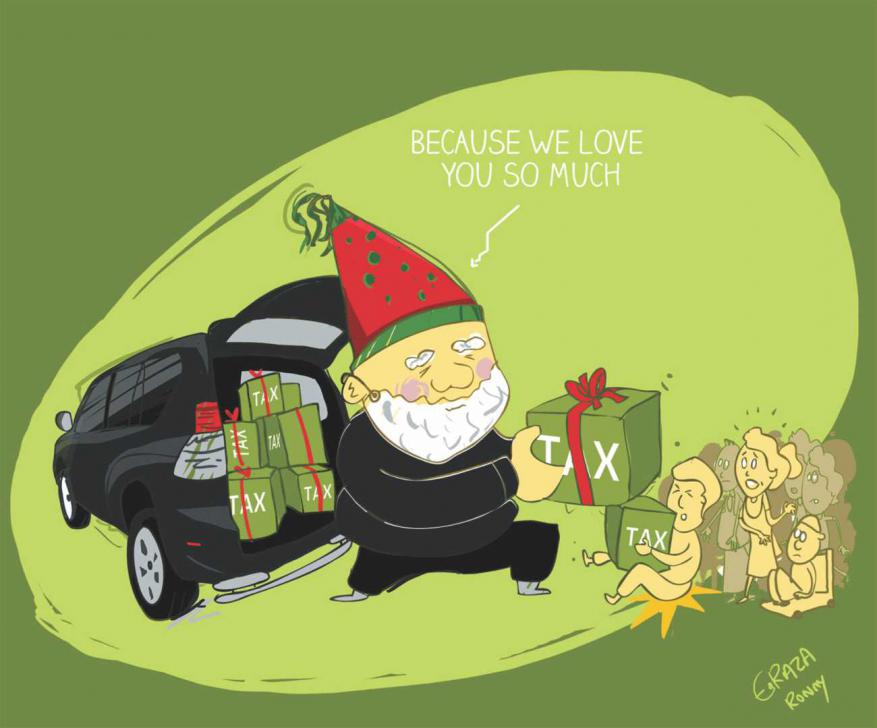Published in The Daily Star on Monday, 5 June 2017
MACRO MIRROR
BUDGET FY2018
 Bangladesh’s national budget for FY2018 comes at a challenging time. Despite being powered by high growth and cushioned by low international prices, the Bangladesh economy has been facing a number of disquieting features. Exports have seen slow growth in FY2017 and remittances have been declining for some time. While private investment is yet to pick up, steering the wheel of the economy, public investment has been making up the void to some extent, but faces the challenge of improving efficiency and accountability of large expenditures. Employment generation has slowed down despite high GDP growth. And to top it all, piled up bad loans in the banking system have hit the governance of the whole financial sector.
Bangladesh’s national budget for FY2018 comes at a challenging time. Despite being powered by high growth and cushioned by low international prices, the Bangladesh economy has been facing a number of disquieting features. Exports have seen slow growth in FY2017 and remittances have been declining for some time. While private investment is yet to pick up, steering the wheel of the economy, public investment has been making up the void to some extent, but faces the challenge of improving efficiency and accountability of large expenditures. Employment generation has slowed down despite high GDP growth. And to top it all, piled up bad loans in the banking system have hit the governance of the whole financial sector.
The task of formulating a budget in such a situation is understandably not easy. Maintaining the growth momentum, energising the investment, creating jobs and reducing poverty – all demand the close attention of policymakers.
The budget can be a tool to achieve these objectives which in the medium and long term would benefit the citizens of the country. It can also directly affect the lives of people in the short run particularly through various fiscal and allocative measures. That is why every year common people become curious and alert about the proposals of the upcoming budget. They are interested to know which goods and services will become costlier, which ones will be cheaper and how they have to plan their future consumption patterns within their limited income. More often than not, the middle class feels the pinch of fiscal measures more than others.
The proposed budget for FY2018 does not bring anything for the middle class to cheer for. Due to a number of measures, the middle class has to brace themselves for having more money drained out of their pockets with less net income. The tax exemption threshold for personal income tax remains the same at Tk 2.5 lakh for the last three fiscal years without being adjusted for the inflation rate. Similarly, tax for income up to Tk 6.5 lakh remains unchanged at 10 percent. In its budget recommendations for FY 2018 the Centre for Policy Dialogue suggested for lowering the personal income tax rate for this income threshold to 7.5 percent so that they have more disposable income. The foregone revenue could be made up for through bringing more taxpayers into the net and collecting resources from tax evaders.

With the ambition to achieve 26.2 percent higher public expenditure, the revenue mobilisation effort has also been set 31.8 percent higher than the revised budget for FY 2017. The attempt to meet this large revenue target is thus desperate. Ironically, people who are already in the tax net become the target for additional tax collection. Such extraction from soft targets is demotivating for honest taxpayers. A classic case of resorting to another easy route is the proposal to increase excise duty on bank deposits. In most cases, individual deposits are already taxed.
As it is, interest rate on bank deposits has declined drastically during the last few years due to low demand for credit in the face of tepid private investment. Higher excise duty coupled with income tax deduction at source, various bank charges, and inflation rate would reduce the net return from bank deposit instead of gains. This will discourage savers to keep money in the bank. This is contrary to the objective of enhanced financial inclusion and encouraging bank transactions for more transparency.
Whether a person having a bank balance of Tk 1 lakh is wealthy or not is an illusion. For a petty salaried person, Tk 1 lakh is a large amount. Even for those who earn a monthly income of Tk 1 lakh and live in Dhaka this is a dear amount. Thanks to mal-governance in the banking sector and corruption in the economy, a lot of unearned money is also floating in the market. This has pushed up the cost of living which cannot be explained by the official inflation rate. The pressure of this easy and unaccounted money has reduced the value of Tk1 lakh significantly which many of us may not realise.
In the event of any shocks of such as critical illness, the middle class risks sliding into the lower income group or even into poverty. The non-existence of social protection by the state and low allocation for the social sector has put the full burden on the people themselves. Allocation for the health sector is abysmally low at 5.2 percent of the total budget expenditure, 0.92 percent of the GDP in the proposed budget.
The initiative of implementing the VAT act is a positive step as it would streamline revenue collection through a modern system. In the midst of hue and cry, a number of items have been kept outside the VAT. Despite several products being exempted from VAT the apprehension of price hike and inflation continues since market prices in Bangladesh do not follow any norm. In the absence of consumer protection and market monitoring measures, consumers end up paying a lot more without any reason. No plausible explanation can be given why a kilo of chickpeas goes up from Tk 80 to Tk 90 within 24 hours. So the operational issue for VAT exemption in reality has to be followed up so that the benefit is transferred to consumers.
The middle class is considered to be the driving force for higher growth and investment across the world. As a thriving economy Bangladesh should not undermine the potential of its large and growing middle class.
The writer is the Executive Director of the Centre for Policy Dialogue.


